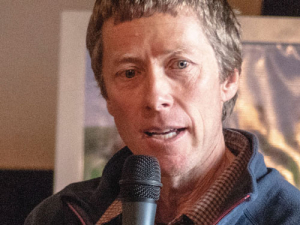Cheviot-based McFadden works throughout the North Canterbury area, but says he’s finding that many of the native plantings done 10-15 years ago are now being smothered by weeds such as old man’s beard.
“There are certain areas now that we do not recommend to plant,” he told Rural News.
“We learn over time, and we learn the pitfalls of fencing waterways and the pitfalls of planting waterways. It’s not always as easy we thought it would be,” says McFadden.
“There certainly are a lot of waterways that can be planted successfully, and there are regions that don’t have the same degree of weed issues that we do here. But that would be the worst thing, to have a mandatory nationwide requirement to plant waterways.”
McFadden says some areas of North Canterbury’s Amuri district are particularly bad. The region’s four main rivers – the Hurunui, Waitohi, Pahau and Waiau – are all loaded with weeds including “six of the worst” – old man’s beard, blackberry, gorse, broom, elderberry and willow.
Old man’s beard can climb 10 - 20m over native trees and smother them, and its windborne seeds can travel 1 - 2km. It is now getting into native plantings.
“I’m always very careful when advising whether to plant or not. I think the important thing first is to look after your waterways. Get your intensive farming activities out of your waterways. Get your waterways as clean as possible.”
Farmers who want to plant natives can do so, but should understand they may be in for maintenance “forever and a day,” he says.
McFadden believes one option is to plant flax and a swamp grass called carex secta – both immune to the herbicides Grazon and Tordon.
“I call them the filters of the land because they’re really good as a filtration plant as a buffer,” he says. “You can still spray over them. That will take out certain weeds, but it won’t kill flax and carex.”
Challenge pays off
Jamie McFadden has worked with Medbury Farm, recently named the 2018 Canterbury regional supreme winner in the 2018 Ballance Farm Environment Awards.
Speaking at the winner’s field day, McFadden says the farm was a challenge as it was bounded by two of the weed-infested rivers.
“With Medbury when I first looked I said ‘I don’t think planting is a good idea on your farm. It’s always going to keep coming back and your plants will never ever beat it.’ ”
Medbury has gone ahead with extensive planting. “It’s an ongoing battle that will never stop, but good on them for wanting to look after their environment,” McFadden says.
Born and raised at Cheviot, McFadden and his wife started a native plant nursery 20 years ago, primarily for planting out their own 800ha steep hill country farm.
McFadden says he’s now noticing that a lot of plants are escaping from gardens and moving up and down the region’s waterways.









